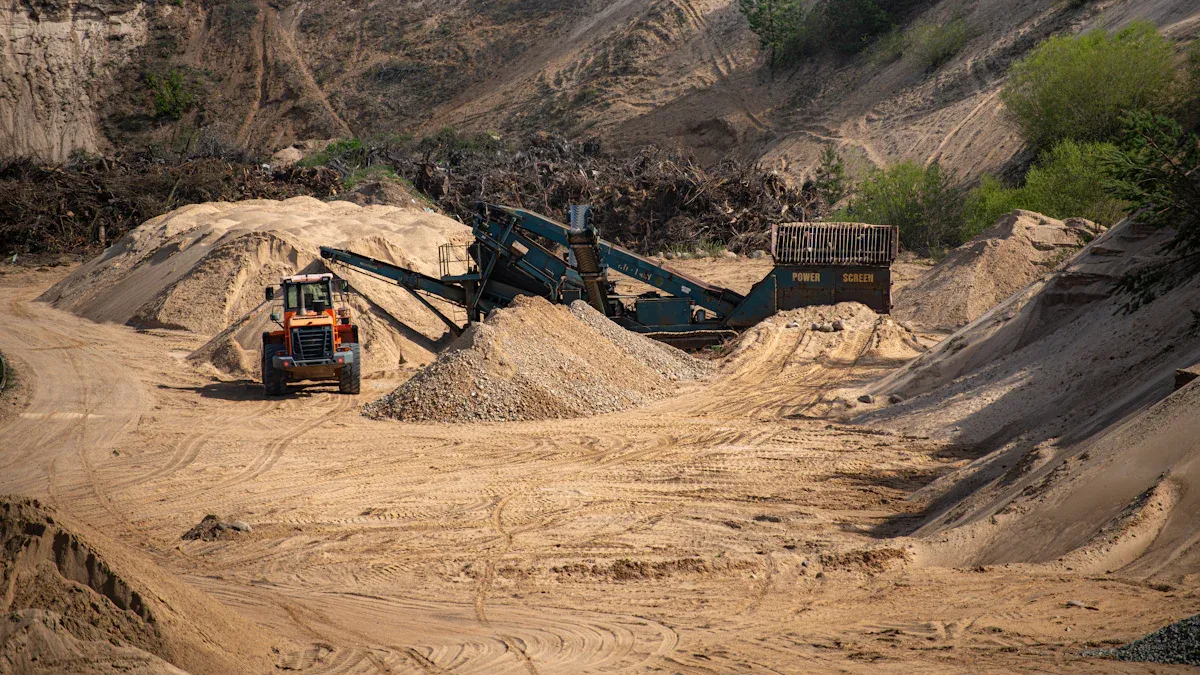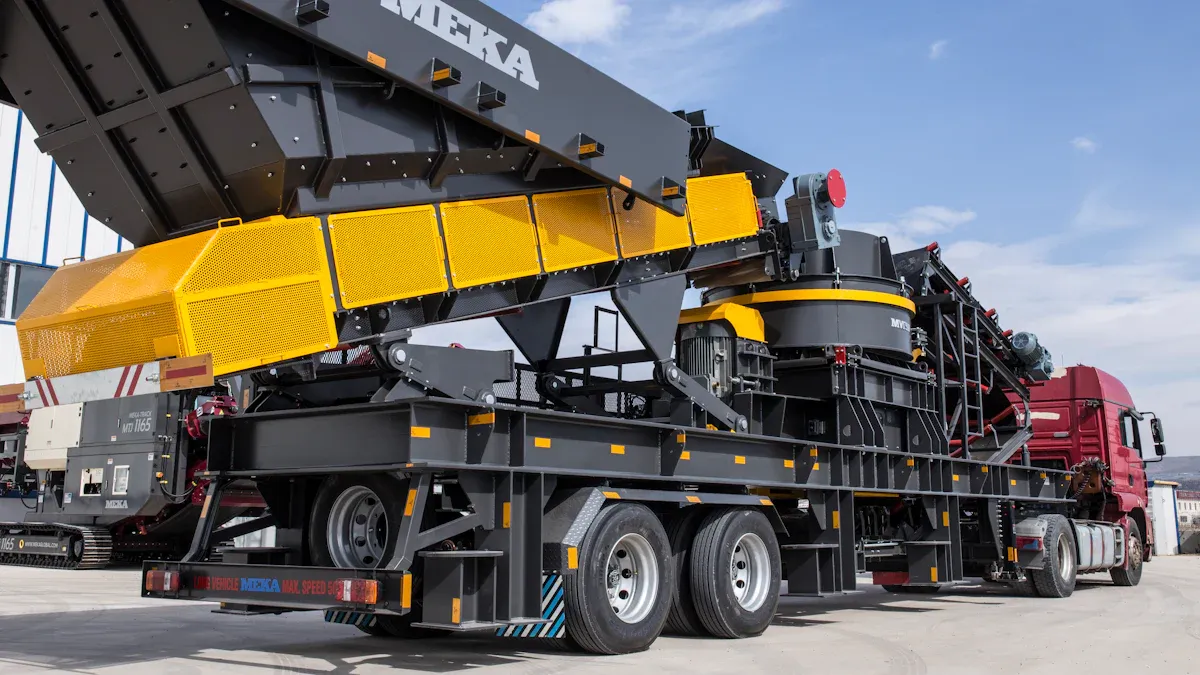
Посао каменолома захтева опрему која вредно ради. Висококвалитетнамашина за дробљење чељуститешко се носиматеријал за ливењеи наставља снажно да трчи.
- Мобилност скраћује време транспорта, повећавајући продуктивност.
- Делови паметне чељусне дробилице трају дуже, штедећи новац.
- Нови делови и дизајн дробилице значе мање застоја и већи учинак.
Кључне закључке
- Висококвалитетне машине за дробљење чељустиефикасно дробе велике, жилаве стене, повећавајући продуктивност каменолома и скраћујући време транспорта помоћу мобилних опција.
- Издржљиви дизајнии паметни материјали смањују потребе за одржавањем, смањују трошкове поправке и одржавају дробилицу у раду дуже са мање застоја.
- Константан учинак и једноставне функције за коришћење помажу оператерима каменолома да одрже стабилну производњу, побољшају безбедност и повећају профит.
Предности чељусне дробилице за рад у каменолому

Примарна снага дробљења и свестраност
Каменолом је потребна машина која може да обрађује велике, тврде стене.машина за дробљење чељустиистиче се јер може лако да здроби велике комаде материјала. Већина модела може да поднесе камење до70% величине улазаи разложити их са односом редукције од око 3:1. Неке машине, попут Portafill MJ-9 или Keestrack B7e, могу обрадити између 150 и 400 тона на сат. Оператори су тестирали ове машине са тврдим материјалима као што су базалт и плава стена, а резултати сваки пут показују снажне перформансе.
Мобилне чељусне дробилице додају још већу флексибилност. Омогућавају радницима да премештају дробилицу на различита места у каменолому или чак на нова места. Ово штеди време и новац на транспорту. Машина чељусне дробилице такође одржава ниске оперативне трошкове јер њени делови дуже трају и захтевају мање пажње. Иако можда не производи најмање или најкубичније камење, она обавља тешки посао на почетку процеса. За многе каменоломе, ова снага и свестраност чине машину чељусне дробилице најбољим избором за примарно дробљење.
Издржљивост и смањене потребе за одржавањем
Машина за дробљење чељусти мора свакодневно напорно да ради. Инжењери користе напредне алате као што суанализа коначних елеменатаи рачунарски потпомогнуто пројектовање како би се осигурало даплоче за окретање вилицесу јаке и лагане. Ово помаже да машина дуже траје и троши мање енергије. Студије показују да употреба композитних материјала у плочи вилице може смањити хабање и потрошњу енергије.
- Тестови замора на конструкцијама чељусних дробилица доказују да могу да издрже године тешког рада.
- Нови патенти и дизајни за хабајуће плоче помажу у продужењу века трајања машине и смањењу застоја.
- Теренски тестови са чељусним дробилицама на дизел погон показују да промена начина рада машине може помоћи у планирању одржавања и одржавању дробилице у несметаном стању.
- Механички прегледи истичу да прави материјали и избор дизајна чине машину за дробљење чељусти издржљивијом и лакшом за одржавање.
Ова побољшања значе мање времена за поправку машине и више времена за дробљење камена. Власници каменолома имају мање кварова и ниже трошкове поправке, што помаже да посао тече несметано.
Доследан учинак и оперативна ефикасност
Рад каменолома зависи од стабилне и поуздане производње. Када је Боралов каменолом Линвуд прешао на модерну чељусну дробилицу, доживели су велике промене. Нова...Метсо Нордберг Ц140 чељусна дробилицаповећао је проток и учинио производ конзистентнијим. Аутоматизована подешавања размака одржавала су стабилан излаз и смањивала потребу за ручним проверама. Ово је учинило рад безбеднијим и ефикаснијим.
Мобилне чељусне дробилице такође помажу у глатком функционисању. Неки модели могуруковати до 1.500 тона на сатако је довод стабилан. Карактеристике као што суекстра дугачке чељусти спречавају блокадеи одржавати кретање материјала. Даљинске команде и опције претходног просејавања помажу у смањењу хабања и чине цео процес ефикаснијим.
Чељусна дробилица даје оператерима каменолома поверење да ће њихова опрема пружати исте висококвалитетне резултате дан за даном. Ова поузданост значи мање застоја, бољу безбедност и већи профит за пословање.
Избор праве чељусне дробилице за ваше пословање
Усклађивање спецификација са потребама за материјалом и капацитетом
Избор праве чељусне дробилице почиње разумевањем материјала и количине коју треба обрадити. Оператори разматрајувеличина хране, производни капацитет и потребе за енергијомМашина мора да одговара највећим стенама у каменолому и да поднесе свакодневно оптерећење. Многе модерне дробилицепратите радне сате, потрошњу горива, па чак и шаљите упозорења за одржавањеОве карактеристике помажу оператерима да машина ради глатко и да одаберу прави модел према својим потребама.
- Чељусне дробилице најбоље радеса тврдим, абразивним материјалима.
- Они могуобрађује величине увлачења до 1.500 мм.
- Производне стопе се крећу од 200 до 1.000 тона на сат.
- Потрошња енергије остаје ниска, што помаже у контроли трошкова.
- Одржавање је једноставно, тако да је време застоја мање.
Када оператери подесе подешавања, попут брзине, могу повећати производњу. Ова флексибилност чини чељусну дробилицу паметним избором за многе каменоломе.
Поређење машина за чељусне дробилице са другим типовима дробилица
Ево кратког прегледа како се чељусне дробилице пореде са другим дробилицама:
| Карактеристика | Дробилица вилице | Ударна дробилица | Конусни дробилица |
|---|---|---|---|
| Структура | Виличне плоче | Ротор и чекићи | Огртач и конкаван |
| Принцип рада | Компресија | Утицај | Компресија/гираторија |
| Фаза пријаве | Примарни | Секундарно/Терцијарно | Секундарно/Терцијарно |
| Капацитет | Средње-високо | Средњи | Високо |
| Величина уноса | Највећи | Мањи | Широк опсег |
| Величина излаза | Грубо, подесиво | Кубични, подесиви | Добро градирано, кубично |
| Одржавање | Ниско | Умерено | Више |
Чељусне дробилице се истичу по својој способности да обрађују велике стене и чврсте материјале уз мање одржавања.
Практична разматрања: Мобилност, једноставност коришћења и дугорочна вредност
Оператери каменолома цене машине које се лако померају и једноставне су за употребу.Мобилне чељусне дробилице могу се брзо кретати између локација, штедећи време и новац. Модуларни дизајн олакшава одржавање и помаже машини да се уклопи у различите поставке. Нова технологија, попут делова отпорних на хабање и паметних сензора, одржава машину у раду дуже и помаже у планирању поправки пре него што почну проблеми. Ове карактеристике дају каменолома поверење у њихову инвестицију и помажу им да остану продуктивни годинама.
Избор висококвалитетне чељусне дробилице помаже расту сваког каменолома. Оператори виде дуже време рада, мање застоја и стабилан учинак.
- Дигитални сензори и предиктивно одржавањеповећати поузданост
- Хибридни погонски склопови подржавају одрживост
- Флексибилни модели услуга и изнајмљивања одговарају променљивим потребама
Многи купци кажу да ове карактеристике чине њихове операције у каменолому глаткијим и исплативијим.
Честа питања
Колико често оператер каменолома треба да сервисира машину за дробљење чељусти?
Већина оператера проверава машину сваки дан. Чисте делове и траже хабање.Редовна услугаодржава дробилицу у добром стању и помаже у избегавању великих поправки.
Савет: Подесите подсетник за дневне провере. Ова навика штеди време и новац.
Које материјале може да обрађује чељусна дробилица?
Чељусна дробилица најбоље ради са тврдим стенама попут гранита, базалта и кречњака. Такође може да дроби рециклирани бетон и неке руде.
- Гранит
- Базалт
- Кречњак
- Рециклирани бетон
Да ли је мобилна чељусна дробилица боља за мале каменоломе?
Мобилне чељусне дробилице добро се уклапају у мале каменоломе. Лако се крећу и брзо се постављају. Оператори штеде на трошковима транспорта и могу брзо почети са радом.
Време објаве: 30. јун 2025.